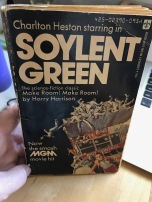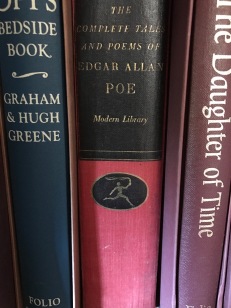Today, I’m acknowledging three things. #1, I am not going to live forever. (What?!?) #2, I am never going to live in an English country manor with an enormous library with shelves to the ceiling. #3, my daughter and granddaughters are not going to see it as a positive thing if they inherit thousands of books. Okay, four things: #4, my paperback  copy of Harry Harrison’s Make Room, Make Room with the movie tie-in picture from Soylent Green, cover price 95 cents, whose glue has disintegrated so the cover is just a holder for the loose pages, isn’t worth any money now and never will be.
copy of Harry Harrison’s Make Room, Make Room with the movie tie-in picture from Soylent Green, cover price 95 cents, whose glue has disintegrated so the cover is just a holder for the loose pages, isn’t worth any money now and never will be.
So I’m purging my shelves
The Marie Kondo approach didn’t work for me. You know – take all your books out of the shelves and touch each one, and only give shelf space to the ones that spark joy. I’m not the exact same person every day, and I don’t trust myself to guess what will spark joy for Future Me.
Deciding if you can safely purge
The best advice I found online is The Booklover’s Guide to Purging Books, which recommends using Google to help figure out what to get rid of:
- Can you get it digitally for free?
- Is it obsolete? This applies mostly to nonfiction.
- Is it worth something?
- Is it still in print? I would add, is it available as a paid ebook?
Once you’ve done your research, you can decide:
- Would you absolutely love reading it again?
- Is it a book you cherish and want to keep? (Ah, there’s that spark of joy!)
And I would add to that:
- Is it cited often? I like being able to pull my Modern Library edition of Poe
 off the shelf to read The Raven when I come across a reference to it. Same with Asimov’s Three Laws of Robotics and Shakespeare’s plays. I know I can easily find these things online but what if the internet’s down?
off the shelf to read The Raven when I come across a reference to it. Same with Asimov’s Three Laws of Robotics and Shakespeare’s plays. I know I can easily find these things online but what if the internet’s down?
Which brings me to the zombie apocalypse. Or, if you prefer, the lingering illness or debilitating injury. I can easily imagine a scenario in which I’m trapped at home and have no internet or even have no electricity, so couldn’t charge up my Kindle. (And by the way, I’m on my fourth Kindle; they don’t last forever.) This is the real reason I’ve accumulated so many books – the fear of having nothing to read (Twitter calls this abibliophobia).
I’m pretty sure that once I’ve finished my purge, there will still be plenty of things to read in my house. So I’m making a start today with the top shelf of my science fiction paperback bookcase – Aldiss through Bova, with a smattering of others that snuck in because their own shelves were full.
How do you manage to keep your bookshelves under control? I have a feeling I’ll be working on this for a long time. Any tips gladly appreciated.


